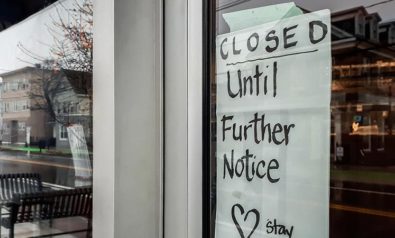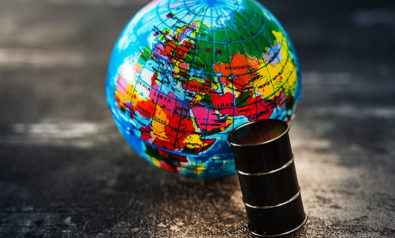*Author’s note: This article was written on March 13, 2020. Some issues and data may have changed since then.
I am writing this column in a state of a latent denial. Having worked from home for much of the past week, I’ve been trying to juggle work duties with kid’s entertainment as schools and childcare facilities are shut down.
Will a Struggling Global Economy Survive the Coronavirus?
But denial is unwarranted, as we wake up to another series of breaking news, including the US ban on any European travel for 30 days, the World Health Organization’s declaration of the COVID-19 outbreak as a pandemic and the crashing stock markets.
The situation in Wuhan, China, looked dire just weeks ago. Yet that seems like a distant memory ever since Prime Minister Giuseppe Conte put the whole of Italy in quarantine. Medics attending to COVID-19 patients have provided shocking accounts of the state of affairs in the European epicenter of the coronavirus outbreak.
The Recession
The consequences of the pandemic for the global economy will without a doubt be crippling. To be frank, it’s not like we haven’t been pondering the onset of the next recession for some time now — we have. A distinct slowdown in real activity, manufacturing and trade, coupled with leading indicators such as business and consumer confidence on a downward trajectory, has for many months signaled the final stage of the current economic cycle. This economic expansion has been exceptionally long, although that alone does not increase the probability of a recession. The inverted yield curve in the US set in in the summer of 2019 was another indicator. In fact, Google searches for the term “recession” soared in tandem and are predicted to skyrocket in the days ahead.
It is little wonder why this has happened. According to the US Centers for Disease Control and Prevention, and other agencies operating in the field of public health, our best bet for slowing down the contagion is social distancing. That’s why in order to contain the coronavirus, authorities in the worst-hit areas have locked down cities, entire countries, imposed full travel bans or restricted the movement of millions of people and limited or suspended business operations. And we thought the global economy had problems.
While at this point it is hard to quantify the COVID-19-induced recession, the measures undertaken give some pointers as to what economic channels become compromised, as the spread of the virus continues. Quarantines hamper both consumption and production as consumers and workers are bound to stay at home. This places a limit on household spending on both goods and services. Supply chains also get disrupted as production is cut back and fewer goods are sold and exported. Foreign demand decreases, too.
Moreover, sectors like Chinese manufacturing or the travel and tourism industry — the latter approximately accounts for more than 10% of global GDP, according to the World Travel and Tourism Council — will particularly feel the impact. The fact that it is difficult to predict the future path, extent and seriousness of the outbreak adds to the decline in confidence.
A classic transmission of the shock is taking place via the financial markets, which have priced in the disruptive potential of the outbreak quite aggressively. As major stock markets sell-off, household wealth will act as an additional setback on future consumption due to the effect on purchasing power. To be clear, the COVID-19-induced downturn would be a crisis of the real economy first and foremost, emanating from severe hits to real activity on both the supply and demand side, rather than a classic financial crisis.
The Recovery
On the upside, China is beginning to rise from the ashes of the coronavirus outbreak. The recent fall in crude oil prices may help, with China being the largest crude oil importer in the world. On the policy front, some central banks have responded with the usual medicine — the US Federal Reserve leading the way in delivering a surprise 50-basis points cut and G7 leaders vowing to fiscal stimuli.
History provides clues for how to recover from similar disruptions. Empirically, most recoveries from epidemics have been V-shaped, thus marked by a relatively brisk rebound after an initial epidemic-induced slump.
There is no way to prepare for a Black Swan moment of such magnitude. But, speaking from a long-term macroeconomic policy perspective, let’s admit that we have taken some shortcuts. Not giving names and pointing fingers, the former chief of the European Central Bank (ECB), Mario Draghi, advocated the importance of structural reforms and growth potential-enhancing measures in each ECB press statement I can possibly recall.
Yet we haven’t exactly done our homework on the resilience front. It would have been nice to enter the new decade with more funds for rainy days. So yes, we are on the verge of a grave crisis, both human and economic. But crises can teach us a lesson or two. Ours is that once the affected regions emerge from the current standstill, we will have to fire up all our engines in an integrated and well-rounded policy strategy and get our hands dirty… really dirty.
*[GLOBSEC is a partner institution of Fair Observer.]
The views expressed in this article are the author’s own and do not necessarily reflect Fair Observer’s editorial policy.
Support Fair Observer
We rely on your support for our independence, diversity and quality.
For more than 10 years, Fair Observer has been free, fair and independent. No billionaire owns us, no advertisers control us. We are a reader-supported nonprofit. Unlike many other publications, we keep our content free for readers regardless of where they live or whether they can afford to pay. We have no paywalls and no ads.
In the post-truth era of fake news, echo chambers and filter bubbles, we publish a plurality of perspectives from around the world. Anyone can publish with us, but everyone goes through a rigorous editorial process. So, you get fact-checked, well-reasoned content instead of noise.
We publish 2,500+ voices from 90+ countries. We also conduct education and training programs
on subjects ranging from digital media and journalism to writing and critical thinking. This
doesn’t come cheap. Servers, editors, trainers and web developers cost
money.
Please consider supporting us on a regular basis as a recurring donor or a
sustaining member.
Will you support FO’s journalism?
We rely on your support for our independence, diversity and quality.
































